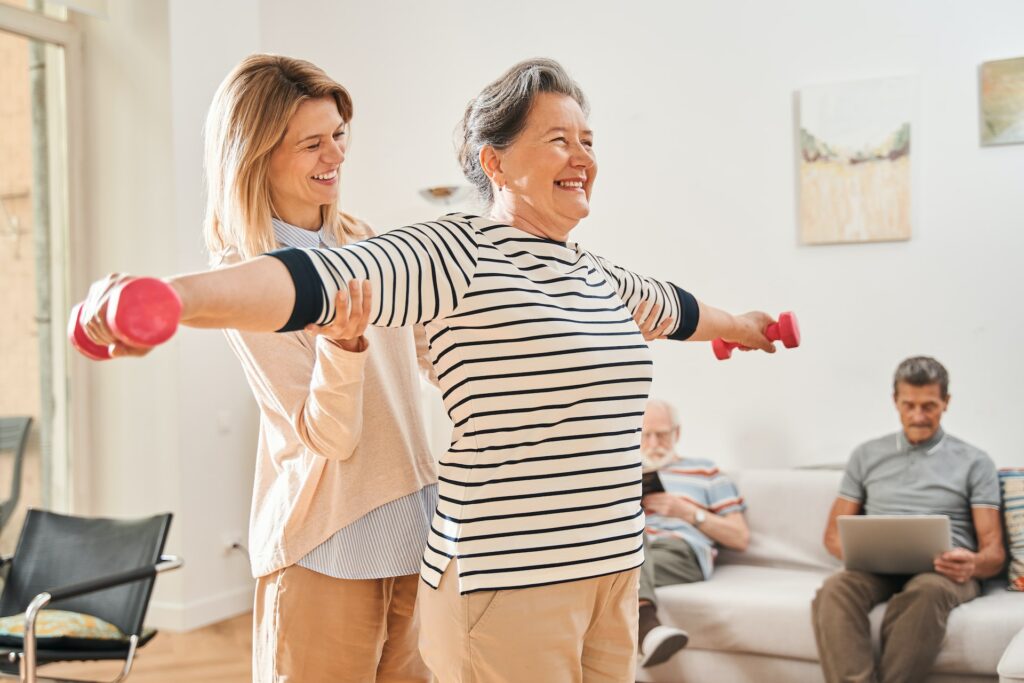Supporting Mental Health & Wellness in Assisted Living Communities

Positive mental health and overall wellness play a crucial role in ensuring a fulfilling and satisfying experience for seniors in assisted living communities. At Route65.ca, we understand the importance of nurturing an environment that supports and fosters mental well-being for seniors in British Columbia, contributing to their overall quality of life and their ability to thrive in their new living arrangements. We aim to provide seniors and their families with comprehensive resources and guidance to help them find exceptional communities that prioritize mental health and wellness.
In this educational blog post, we will examine the various factors that contribute to maintaining mental health and wellness for seniors in assisted living communities. From the importance of socialization, cognitive stimulation, and physical activity to the crucial role of nutrition, sleep, and emotional support, we will delve into a holistic approach to mental well-being for seniors. Additionally, we will provide practical tips and advice on how families can support their loved ones’ mental health during their transition to assisted living and as they settle into their new environment.
By understanding the significance of mental health and wellness for seniors in assisted living communities and implementing strategies to support their well-being, families can help their loved ones create a positive and enriching experience within the community, promoting lasting emotional health and overall satisfaction.
Supporting Mental Health & Wellness in Assisted Living Communities
1. Encouraging Socialization and Building Connections
Strong social connections contribute to improved mental health and overall well-being for seniors in assisted living communities. Here are some ways to encourage socialization and foster meaningful relationships:
– Participate in Community Activities: Seniors should take advantage of the various activities and events offered by their assisted living community, as these provide opportunities to connect with fellow residents and staff members.
– Pursue Shared Interests: Seeking out clubs, social groups, or classes within the community focused on shared interests can help seniors forge friendships based on mutual passions and hobbies.
– Establish a Support Network: Developing a support network of friends and trusted staff members within the community can offer emotional support and comfort during challenging times or transitions.
– Regular Family Contact: Encourage frequent communication and visits from family members to maintain strong connections and a sense of belonging.
2. Promoting Physical Activity and Exercise
Physical activity plays a vital role in supporting mental health for seniors. Engaging in regular exercise can provide various benefits, such as increased energy, improved mood, and better cognitive function:
– Tailored Fitness Programs: Seniors should explore the fitness programs and classes offered by their assisted living community and participate in workouts suited to their abilities and fitness levels.
– Low-Impact Activities: Consider engaging in low-impact activities, such as walking, Tai Chi, or aquatic exercises, which can safely provide physical and mental health benefits.
– Outdoor Spaces: Make use of outdoor spaces in the community, such as gardens or walking trails, to promote gentle physical activity while enjoying the benefits of nature and fresh air.
– Consistency and Routine: Encourage seniors to create a consistent exercise routine, adjusting the duration and intensity as needed to suit their personal needs and preferences.
3. Ensuring Cognitive Stimulation and Mental Engagement
Challenging and engaging the mind is essential for maintaining cognitive health and mental well-being in assisted living communities:
– Brain-Boosting Activities: Seniors should engage in brain-boosting activities, such as puzzles, games, or memory exercises, to promote mental agility and cognitive function.
– Lifelong Learning: Encourage the pursuit of lifelong learning by attending lectures, participating in group discussions, or joining study groups on topics of interest.
– Creative Expression: Create opportunities for seniors to express themselves creatively through activities like painting, writing, or playing a musical instrument.
– Technology Use: Embrace the use of technology to promote mental engagement, whether through brain-training apps, staying connected with loved ones, or exploring new digital hobbies.
4. Addressing Nutrition, Sleep, and Emotional Support
Well-rounded mental health and wellness in assisted living communities involve addressing several crucial factors, such as nutrition, sleep, and emotional support:
– Balanced Nutrition: Ensure seniors maintain a balanced diet rich in nutrient-dense foods, as proper nutrition can have a significant impact on mental health and mood.
– Sleep Management: Encourage healthy sleep habits and address any sleep-related concerns to promote restorative rest and its benefits on mental well-being.
– Emotional Support: Provide emotional support to seniors and help them navigate feelings of anxiety, grief, or stress that may arise during the transition to assisted living, fostering resilience and emotional balance.
– Professional Assistance: If necessary, seek professional guidance from mental health specialists or counsellors to address more complex emotional or mental health concerns.
Conclusion
Supporting mental health and wellness in assisted living communities is a multifaceted approach that involves nurturing strong social connections, promoting physical activity, ensuring cognitive stimulation, and addressing vital factors such as nutrition, sleep, and emotional well-being. By actively engaging in these strategies and understanding their significance, seniors and their families can create a supportive and enriching environment within the assisted living community, contributing to long-lasting mental health and overall satisfaction.
Find the perfect care facilities in British Columbia that emphasize mental health and wellness with the help of Route65.ca. Our thorough and reliable online directory showcases exceptional communities committed to providing a supportive environment for seniors to maintain their emotional well-being and thrive in their assisted living journey. Start exploring our listings today and discover a community that suits your loved one’s unique needs and preferences.
